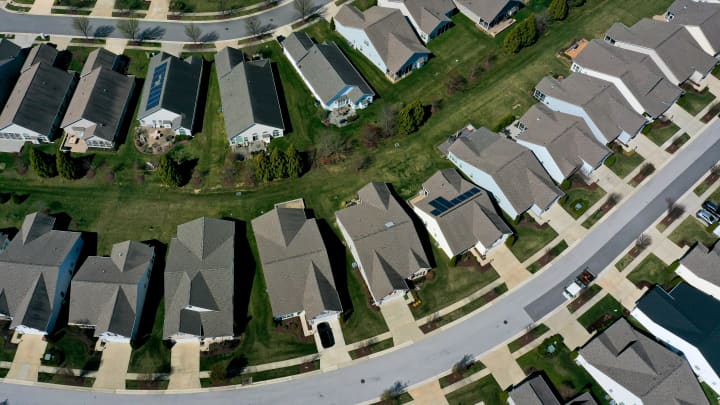
The couple was unwilling to pay those fines and said the HOA and its management company at the time, Homeowners Management LLC, were not responsive to their attempts to get the balance voided. Documentation reviewed by CNBC from as early as 2012 shows that the balance continued to grow. The Inostrozas said communication with the HOA prior to 2011 was by phone.
By August 2015, the HOA put a lien on the Inostrozas' home. In the court documents, the HOA said the Inostrozas owed more than $1,600.
when a party has a legal claim against an asset, such as a home, which can serve as collateral to satisfy unpaid debt. This can open the door to an HOA or other complainant escalating to the next level of debt collection, such as or, in the Inostrozas' case, garnishing wages.
In mid-2015, Jewel Inostroza said the HOA began garnishing wages directly from her paycheck to satisfy the unpaid fees.
"The first time I learned of that was when I got my first paycheck that they garnished," she said. "I didn't get any prior notice.
"There was nothing sent," Jewel Inostroza added. "I got a notice two weeks after."
Despite the garnishment, invoices from the HOA reviewed by CNBC do not show any reduction in the total balance owed. By December 2016, documents show the Inostrozas owed the HOA more than $4,300.
The Inostrozas hired a lawyer, who they say came to an agreement in 2016 with the HOA's attorneys to stop the garnishment. Under that agreement, the Inostrozas would pay approximately $3,100 in installments. They finished paying that amount off by this past January, according to documentation reviewed by CNBC.
"But it seemed like [the deal] never got to the management [company] or homeowners association," Enrique Inostroza said. "They were just adding fines and adding interest."
The Inostrozas estimate they've paid about $12,000 in fines and garnished wages to the HOA in addition to thousands in legal fees to their lawyer. As of Aug. 18, 2023, the most recent invoice the Inostrozas received, the HOA says they owe nearly $8,000.
CNBC reached out multiple times to Homeowners Management LLC for comment and received automated responses directing us to contact the current management company, which changed hands as of August 2023.
A representative of the current management company, Sentry Management, told CNBC because it "just became the management company for this community in the last couple of months, [Sentry has] little ability to comment on historical facts," regarding the Inostrozas' case.
"Once a homeowner has been referred to an attorney for delinquency, which happened well before Sentry
was involved, the homeowner needs to resolve the matter with the association's attorney," Bradley Pomp, president of Sentry Management, explained to CNBC in an email. "We do not have any authority to get involved or bring settlement."
The attorneys that represent the HOA did not respond to CNBC's repeated requests for comment.
The former director of the HOA board, who oversaw the association from 2020 until her resignation in October 2023, declined to comment.
A big part of many HOA sales pitches is that the presence of the organization helps increase property values.
"The board is responsible for protecting property values," said Tom Skiba, CEO of the Community Associations Institute, a membership organization of homeowner and condominium associations . "For most people in the U.S., [their homes are] the single biggest investment they're ever going to make."
There's mixed data about the effects HOAs have on property values.
On average, HOA homes cost — or $13,500 — more on average than non-HOA homes, according to a 2019 study in the Journal of Economics. But those property values can vary significantly by location. A from Critical Housing Analysis of three different U.S. cities found that the home values in HOA areas were less than those in neighborhoods without them.
HOAs can also be necessary to manage shared amenities or land, which can be a value-add for homeowners. In single-family home communities, that could be shared swimming pools or even golf courses. They may also offer homeowners services to help maintain their properties.
"There are associations out there that handle all the landscaping," Skiba said. "Even though you may own your lot, the association cuts the grass and they do all the landscaping. You find that very commonly in over 55 communities where folks just don't want to be bothered with that kind of task anymore. So is that a cost savings? Sure."
The Inostrozas' experience with their HOA highlights some patterns of power dynamics seen across the country.
More than half, 57%, of homeowners with an HOA dislike the arrangement, and more than 3 in 10 say they feel their HOA has too much power, according to a . The lender surveyed 1,001 Americans with an HOA.
"They act as hyperlocal governments and, in many ways, supersede all the other laws that exist," said Steve Horvath, co-founder of advocacy group HOA United.
HOAs are rooted in "the desire for municipalities to offload their responsibilities for taking care of things that you would normally associate with paying your taxes," Horvath said, such as maintaining sidewalks, roads and sewers.
Homeowners who have disputes with their HOA say they have trouble getting help from official government channels.
"The only rights that homeowners have is to take them to civil court," said Raelene Schifano, co-founder of HOA United. "And it's not a successful project."
Lawmakers in several states, including , and , have introduced legislation to address some of the issues homeowners have been raising about HOAs, but they have been met with from the professional management industry.
As of right now, change has to happen at the grassroots level, with homeowners fighting through the court system as well as through voting for a board they feel represents them.
Watch the to learn more about how homeowners associations are shaping American neighborhoods.



